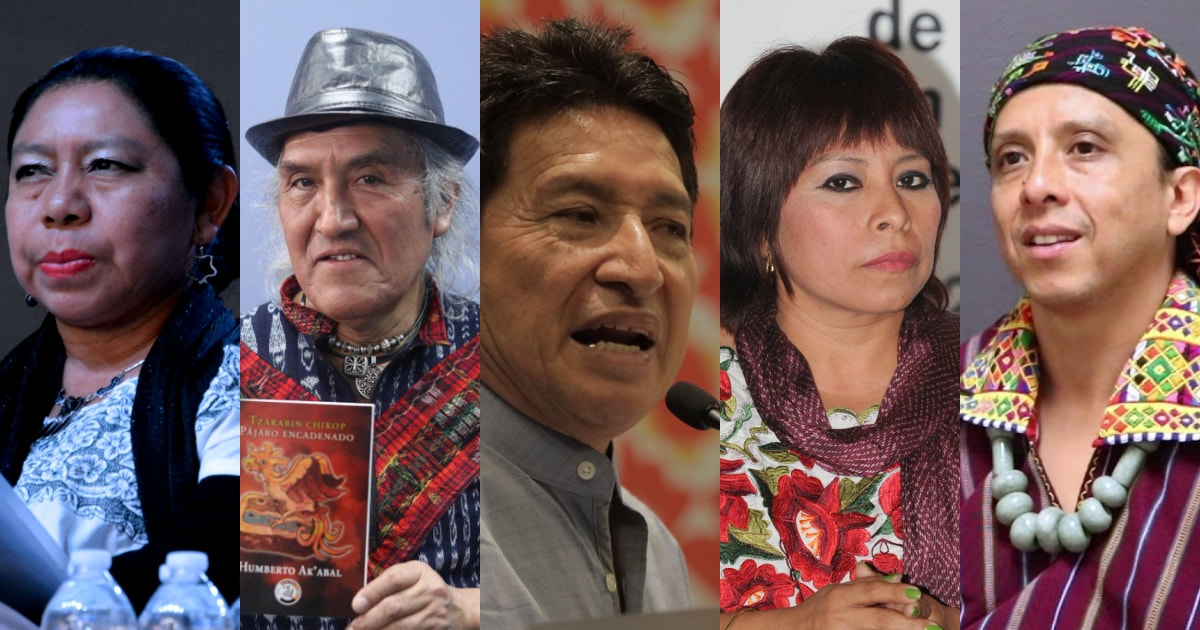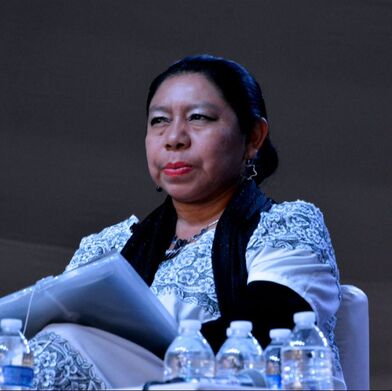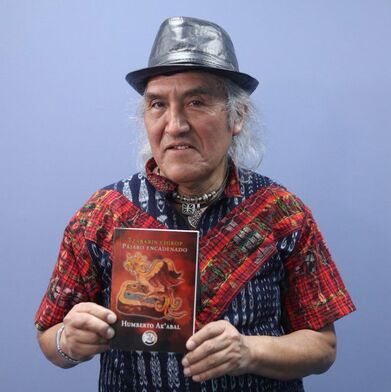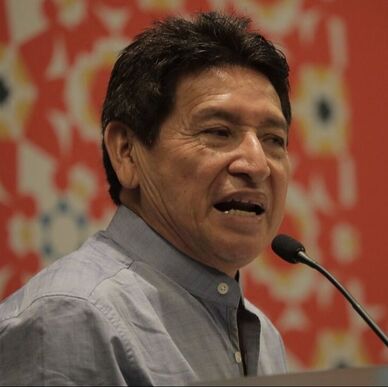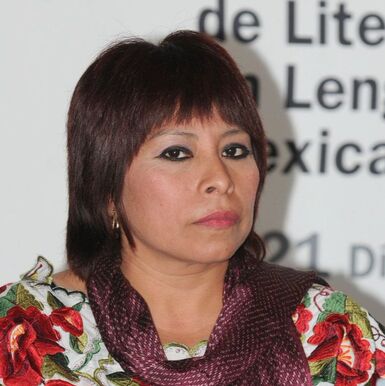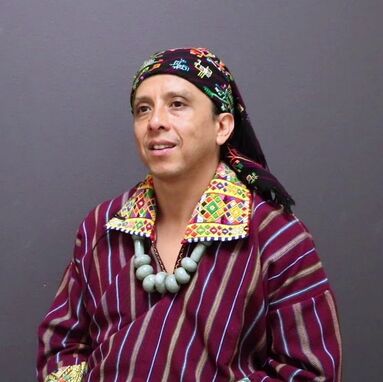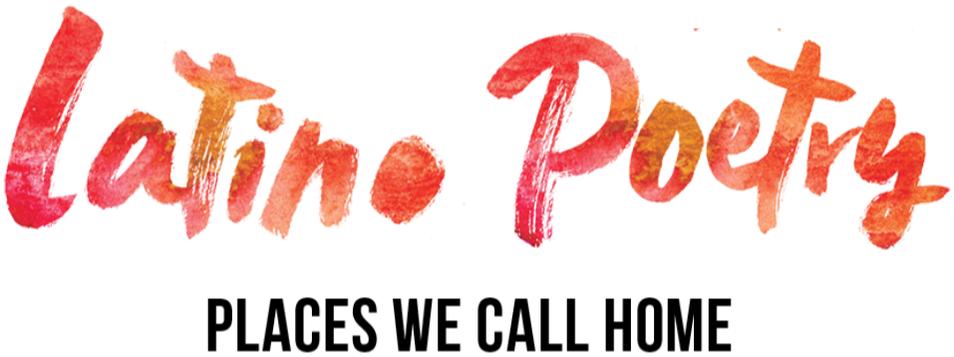5 Mayan Authors You Should Know
|
Briceida Cuevas Cob (born Tepakán, Calkiní, Campeche, Mexico, July 12, 1969) is a Mayan poet. She writes poems about everyday life in Yucatec Maya, many of which have been translated into Spanish, English and Italian. She is a member of Escritores en Lenguas Indigenas A.C. Some of her works include: Flor y canto: cinco poetas indígenas del sur, INI/UNESCO, Tabasco, 1993; Tumbén Ikʼtʼanil ich Mayaʼ Tʼan (Poesía contemporánea en lengua maya), España, 1994; Las lenguas de América. Recital de poesía, UNAM, La Pluralidad Cultural en México, 2005.; Voci di Antiche Radiche, dieci poeti indigeni del Méssico, Hammerle/PEN Club, Trieste, Italia, 2005; U yokʼol auat pekʼ (El quejido del perro en su existencia), Casa Internacional del Escritor, Quintana Roo, 1995; Jeʼ bix kʼin (Como el sol), 1998; Tiʼ u billil in nookʼ /Del dobladillo de mi ropa, 2008; U tsʼíibtaʼal Cháak (Escribiendo la lluvia), Campeche, 2011. |
|
Humberto Akʼabal (31 October 1952 – 28 January 2019), was a Kʼicheʼ Maya poet from Guatemala. Akʼabʼal wrote in his native language of Kʼiche, and then translated his poetry into Spanish. With the translations of his works into numerous languages and international recognition, Akʼabʼal is considered to be "the most renowned Maya Kiʼcheʼ poet" in the world and one of the best known Guatemalan writers in Europe and Latin America.
Since gaining popularity, Akʼabʼal's poetry has been translated into many different languages, including French, English, Estonia, Scots, German, Japanese, Durch, Portuguese, Vietnamese, Hebrew, Hungarian, Arabic and Italian. His numerous awards and fellowships in Switzerland, France, Italy, Mexico and Guatemala as well as The Guggenheim Fellowship. |
|
Jorge Miguel Cocom Pech writes poetry and narrative. He is the author of Muk’ult’an in nool, Secretos del abuelo, J-nool Gregorioe’ juntúul miats’il maya, El abuelo Gregorio un sabio maya, Las nueve preguntas y K’aank’an ya’il icho’ob: wayé, ¡ma’ a t’aan ich maya! Lágrimas de oro: aquí, ¡no hables maya!, U yaajal pi’sáastal, El despertar del alba (not published). His poems and stories have been translated to various languages including: French, Italian, English, Romanian, Catalan, Serbian, Arab, Russian, Mam, Zapotec and Nahuatl.
He was president of Writers of Indigenous Tongues (Escritores en lenguas indígenas, A.C.), from 2002 to 2005, a national association that brings together poets, narrators, play writers, and essayists of indigenous languages of Mexico. Among other recognitions, in 2014 he received the award Gran Premio Internacional de Poesía en Curtea de Arges, Romania. In 2016, he received the award Premio Internacional de Literaturas Indígenas de América (PLIA) and was named Poet of the Year at The Americas Poetry Festival of New York. |
|
Marisol Ceh Moo is a Mexican Maya writer and professor. She writes in the Maya language and in Spanish, and is known for her efforts to revitalize and protect the Yucatec Mayan language. Her novel, X-Teya, u puksi 'ik'al ko'olel (Teya, the Heart of a Woman 2008), is the first written by a woman in the Yukatek language.
Ceh Moo was born in Calotmul, Yucatan, Mexico, 1978. Ceh Moo earned a degree in education from Universidad Autónoma de Yucatán and a degree in law from the Universidad Aliat. In 2007 and 2009, Ceh Moo won the Alfredo Barrera Vázquez award. Ceh Moo became the second woman to win the Nezahualcóyotl Award in 2014. In 2019 Ceh Moo became the first woman to win the Latin American Indigenous Literature Award. |
|
Apab'yan Tew is an international associate professor of the University of Maya Kaqchikel and Ajq’ij, ancestral K’iche’ authority. Under the guidance of the Ajq’ij Diego Adrián Guarchaj Ajtz’alam, linguist, chanter y ceremonial orator, writer, and translator from Nahualá, Guatemala. Apab’yan Tew was initiated in 1998, and currently practices in the highlands of central Mexico, Chiapas and Guatemala.
Ajq’ij is a ceremonial expert in the knowledge of a heritage that has been in execution for millennia. The preparation is demanding, arduous and only available for certain chosen members within a community. A spiritual guide, Ajq’ij, usually has various specializations. He forms part of this tradition as an orator and chanter, herbalist medic, bone therapist, auxiliary midwife, writer, researcher, textile collector, musician and ceremonial dancer. His book, The Birth of the Universe: The Maya Science of Pregnancy, is available in English, Spanish and Mayan K'iche'. |
|
2/5/2020
Comment Box is loading comments...
|
|

